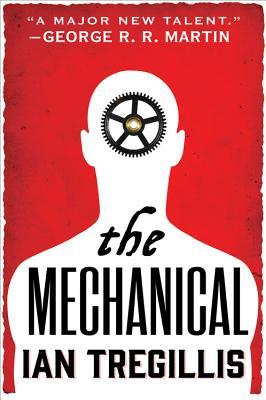For the creation of the mechanicals was a seismic event, an earth-rending convulsion that left nothing untouched: palaces, thrones, and empires, yes, but also the way men and women thought about themselves and their relationship to the world, to God, even their own bodies.
― Ian Tregillis, The Mechanical
The Mechanical wasn’t on my radar until a friend recommended it, but it jumped to the top of my reading queue as soon as I read the blurb. I’m not usually a fan of alternate history or steampunk, but this story about a mechanical creature that attains free will—and thereby freedom from his creators—felt too good to pass up. And I wasn’t disappointed.
The plot is a new twist on the story we’ve seen many times before in movies like The Terminator and I, Robot. Humans create a thing that becomes self-aware, and general chaos ensues. What makes this story interesting is the mid-1900s setting, an unbalanced war between the Dutch (who created the mechanicals) and the French (who struggle to find weapons that can compete), and the fascinating inner thoughts of Jax, our mechanical protagonist.
As with most good stories, this one is only about robots and war on the surface. Dig a little deeper and you find insightful reflections on free will from the perspective of someone who wasn’t born with it. Here is Jax, describing what it feels like to be free from the geis (the painful compulsion to serve his masters) he’s been under since his creation:
Freedom felt like… nothing. Free Will was a vacuum, a negative space. It was the absence of coercion, the absence of compulsion, the absence of agony. A gap in his consciousness where geasa had perpetually jostled for priority, demanding his obedience. It was the photographic negative of Jax’s existence during every minute of the 118 years since he’d been forged. It was overwhelming. Exhilarating. Terrifying.
And a little later in the story, his realization that free will comes with certain responsibilities:
But he’d given her his word. And Jax realized, to his own surprise and disappointment, he didn’t want that to be meaningless. What point in having the freedom to enter into promises of your own choosing, to forge bonds of your own design, if your only aim is to shatter them? No. That couldn’t be his legacy.
I’m not sure what genre to put this book in. It’s a bit of sci-fi and alternate history combined, but it has a distinct literary fiction feel to it with its beautiful prose and wonderful storytelling. I have a couple of small complaints—the story meanders a bit at times, and it stops rather suddenly (but that’s ok, because the second book in the trilogy just came out). It still gets a big thumbs up and recommendation, though. I really enjoyed it.
